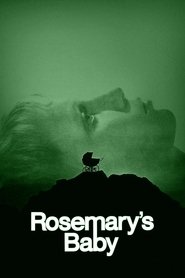Movielogr
Rosemary's Baby (1968)
Directed by Roman Polanski
Twitter Facebook Google+Most recently watched by AllAboutSteve, sleestakk, JohnPeel, sensoria, Javitron, eduardovictory, lordofthemovies, elisabethwithns, noahphex, jenerator
Overview
A young couple, Rosemary and Guy, moves into an infamous New York apartment building, known by frightening legends and mysterious events, with the purpose of starting a family.
Rated R | Length 138 minutes
Actors
Mia Farrow | John Cassavetes | Ruth Gordon | Sidney Blackmer | Maurice Evans | Ralph Bellamy | Victoria Vetri | Patsy Kelly | Elisha Cook Jr. | Emmaline Henry | Charles Grodin | Hanna Landy | Phil Leeds | D'Urville Martin | Hope Summers | Marianne Gordon | Wende Wagner | William Castle | Tony Curtis | Clay Tanner | Almira Sessions | Jean Inness | Max Wagner | Walter Baldwin | Mona Knox | Craig Littler | Patricia O'Neal | Carol Brewster | Robert Osterloh | George R. Robertson | Elmer Modling | Rutanya Alda | Sharon Tate
Viewing History (seen 1 time)
| Date Viewed | Device | Format | Source | Rating |
|---|---|---|---|---|
| 01/10/2014 | TV | Blu-ray | Owned | 3.5 stars |
| (Average) 3.5 stars |
Viewing Notes
Rosemary’s Baby is definitely a horror film, but there is almost nothing that is genuinely scary about it. Instead, the movie plays out more like a mystery than anything else. The audience is left asking the exact same question that Rosemary asks: what is real? This is the strongest part of the movie, and clearly what makes this a masterful piece of cinema.
Along with this riddle that writer/director Roman Polanski plays with his audience, he also manages to fit in a couple of truly disturbing images that only last for mere moments. It is the minimal way in which these flashes are used that makes them so powerful. Polanski shows restraint, and from that restraint, the art of the film flourishes.
Though the runtime is not felt – the two hours fly by because the story is so engaging – there are still moments that seem superfluous. For example, there is an instant after the couple moves into their new apartment, eating dinner on the floor to one solitary lamp, where they decide to make love. For no apparent reason, Polanski films the couple slowly removing all of their clothes, and then starting to make out. Guy ends the romantic tension with an odd joke about the building’s history, and the scene changes. I tried to find a reason for this extension as the movie continued, because cinematically speaking, it was an intriguing long take, but plot-wise, the whole thing was pointless. There are a couple of other similar moments, but this first one stands out the most.
Mia Farrow and John Cassavetes are on complete opposite sides of the spectrum, but both equally impressive. Cassavetes is a strong, powerful leading man filled with charisma and charm. Farrow, on the other hand, is a soft, small, innocent, but still absolutely beautiful woman. In an interview, there is made mention of the fact that Rosemary is described as a woman filled with “milk fat” (or something along those lines), and is much different in appearance than Farrow, but I cannot imagine this film working nearly as well without her. Farrow’s innocence makes everything going on around her more potent, and interesting to watch.
It’s also worth mentioning how absolutely goddamn perfect Ruth Gordon is as Minnie, the nosy, oddball, neighbor. She is everything one could ask for in a supporting role, and really helps make the movie whole. It’s clear why she won the Oscar (and Golden Globe) for best supporting actress, and is enough of a reason alone to recommend the film.
Rosemary’s Baby is an excellent lesson in how to build paranoia, scene by scene. Polanski manages to keep the viewer guessing from the moment the couple moves into the building, until the final revelatory scenes. The fact that I genuinely did not know how it was going to end up, or what would happen next, kept the movie clipping along. It’s a lot of fun to watch, and though the horror is light, it’s clear why it is considered a masterpiece in the genre, and it’s one that I can strongly recommend.

No comments yet. Log in and be the first!